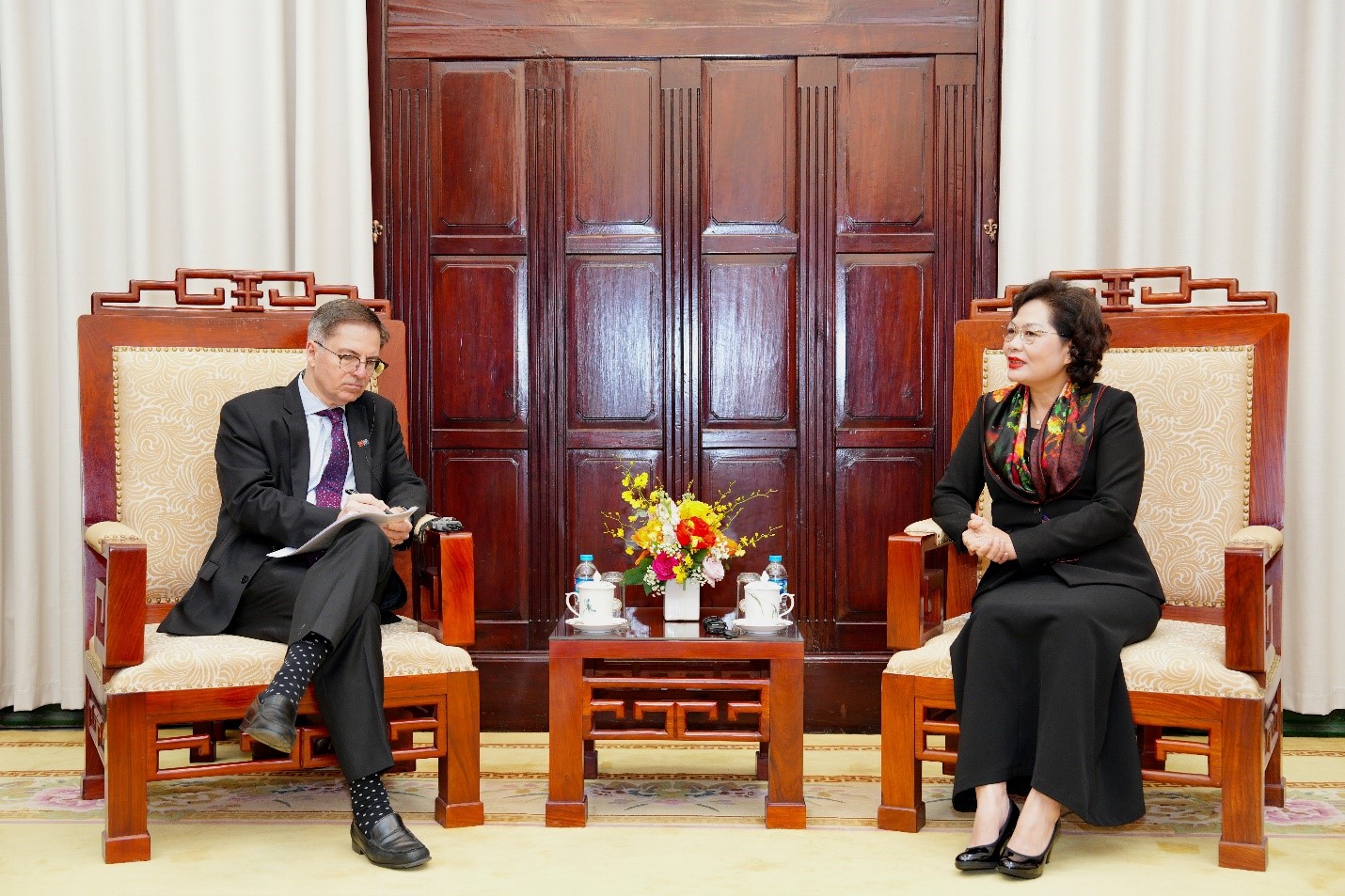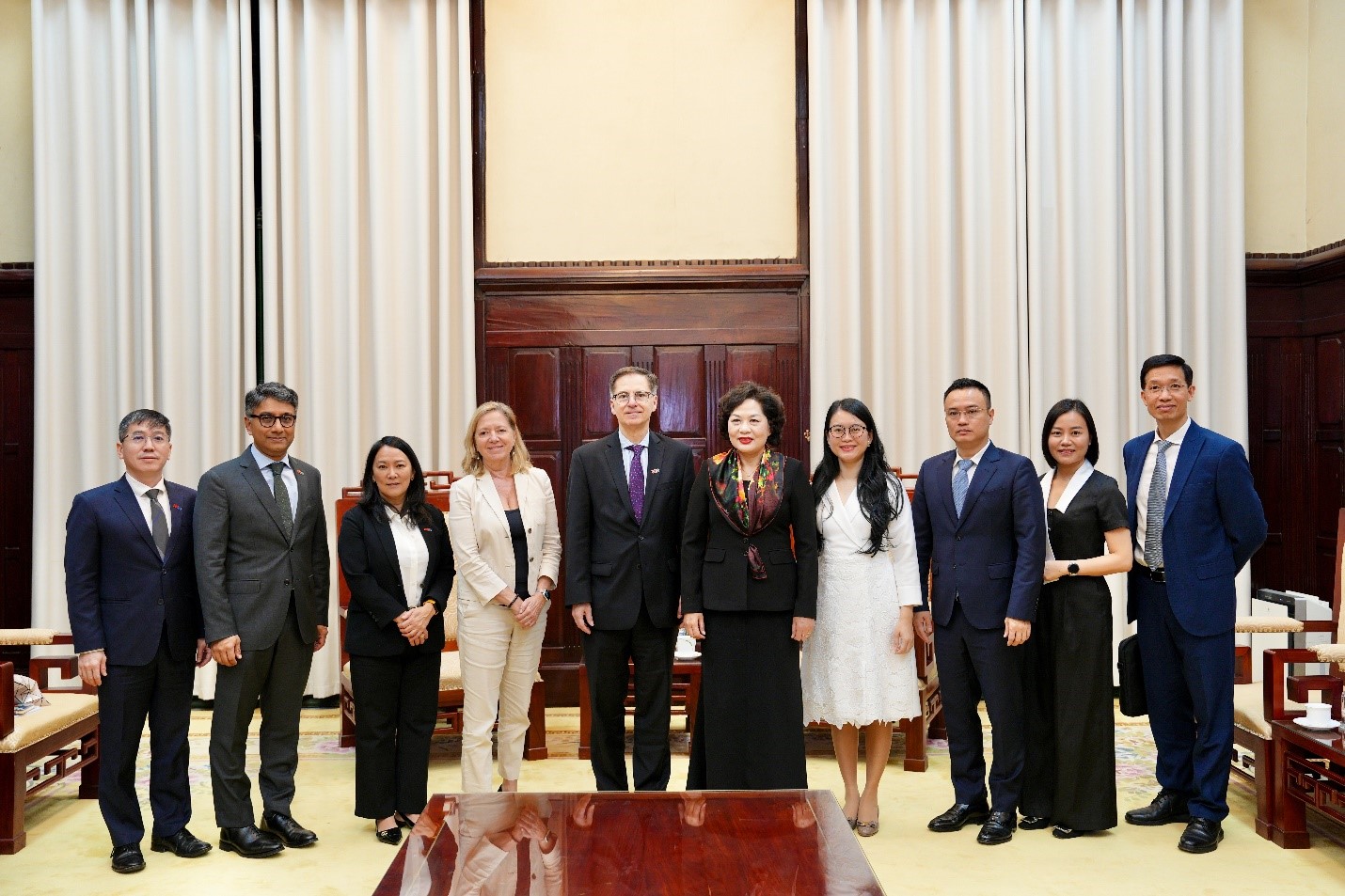On 26 November 2025, Governor Nguyễn Thị Hồng of the State Bank of Vietnam (SBV) held a meeting with Mr. Carlos Felipe Jaramillo, Vice President for the East Asia and Pacific Region of the World Bank (WB). Attending the meeting with the Governor were representatives from the SBV Office and the International Cooperation Department.

Governor Nguyễn Thị Hồng of the State Bank of Vietnam (SBV) held a meeting with Mr. Carlos Felipe Jaramillo, Vice President for the East Asia and Pacific Region of the World Bank (WB)
At the meeting, Governor Nguyễn Thị Hồng reaffirmed that Vietnam highly values the role of the World Bank and the broader multilateral financial institution community amid global challenges, including climate change, inequality, and fiscal risks. The SBV acknowledges the significant shifts in the World Bank’s operational direction in recent years, particularly its strengthened climate commitments, streamlined procedures, shortened project preparation timelines, and the establishment of the East Asia and Pacific Regional Center in Singapore.
The Governor emphasized that the SBV would continue the close cooperation with the World Bank Country Office in Vietnam and the Regional Center to effectively mobilize resources for its development, while leveraging the World Bank’s role as a global knowledge bridge to support its evidence-based policy-making.
The two sides also discusses the World Bank’s latest assessments and policy recommendations for Vietnam as presented in the two recently released reports: “Vietnam 2045 – Institutional Breakthroughs for a High-Income Future” and “Vietnam 2045 – Greener Growth: A Pathway to a Resilient and Sustainable Future”. The Governor welcomed the insightful analyses and valuable policy recommendations in the reports, particularly those relating to human capital and digital infrastructure investment; expanding and improving the efficiency of public investment; strengthening financial-sector regulation and supervision to mitigate systemic risks; promoting green transition; developing high-quality human resources; and accelerating the institutional reforms.
Mr. Jaramillo commended Vietnam’s socio-economic achievements in recent years, especially amid a volatile and challenging global environment. He noted that Vietnam still has significant fiscal space to support growth, particularly through investment in strategic infrastructure projects, which could help ease pressure on the monetary policy. Drawing on his extensive experience in public-sector management, he stressed that sustaining rapid and sustainable growth requires not only further strengthening of the money market but also focused efforts to develop and expand the capital markets, thereby helping establish a more balanced financial structure that better supports long-term investment and economic reforms.
Regarding the banking sector, the Governor agreed with the World Bank’s assessments and recommendations on strengthening the financial-sector regulation and supervision, and the need for harmonious coordination between the fiscal and the monetary policies. She stressed that these orientations align with Vietnam’s development realities and long-term sustainability goals.
The Governor noted that, in 2024, the revised Law on Credit Institutions was enacted to steer the banking system toward greater safety, efficiency, and alignment with international standards, while enhancing risk management capacity, and strengthening the resilience to economic shocks. Credit growth must be associated with efficient capital allocation and risk control, including early risk identification and the progress toward full Basel compliance. The SBV is actively implementing concrete steps to operationalize Basel standards in Vietnam’s banking system, including refining capital adequacy regulations, upgrading internal control systems, and promoting information disclosure and transparency under the three pillars of Basel.
For his part, Mr. Jaramillo agreed with the Governor’s perspective, stating that growth is only sustainable when accompanied by banking system safety, a healthy financial market, and sound macroeconomic fundamentals. He cautioned that excessively rapid credit expansion beyond the economy’s absorption capacity may lead to excess risks, creating pressures and potential consequences for long-term growth.
Governor Nguyễn Thị Hồng reaffirmed that Vietnam’s banking sector is committed to green and sustainable development. The SBV has been and will continue working closely with the Ministry of Agriculture and Environment to finalize a framework for evaluating green projects. This will help integrate environmental and social criteria into the credit assessments, contributing to a banking system that is not only financially robust but also environmentally and socially responsible. These efforts aim to support Vietnam’s commitment to achieving net-zero emissions by 2050, and to direct credit flows toward environmentally friendly projects, thereby promoting the green transformation across the economy.

Delegates attending the meeting take a commemorative photo
Concluding the meeting, the Governor reiterated her appreciation for more than three decades of strong and fruitful cooperation between Vietnam and the World Bank, emphasizing that the World Bank’s support remains essential for Vietnam’s economic growth ambitions. She expressed confidence that amid ongoing global uncertainties and challenges, the World Bank would continue to play a leading role as a key pillar of the multilateral development system, a global knowledge hub, and a major channel for mobilizing resources for reform—thereby remaining a steadfast partner in Vietnam’s journey toward sustainable development.
Box: Mr. Carlos Felipe Jaramillo was appointed World Bank Vice President for the East Asia and Pacific Region on 15 September 2025. A Colombian development economist with over two decades of leadership experience across multiple regions and sectors at the World Bank, he previously served as Vice President for Latin America and the Caribbean (2020–2025), overseeing a portfolio of US$41.5 billion across 31 countries. Before joining the World Bank, he held senior positions at Colombia’s Ministry of Finance, Central Bank, and Ministry of Trade. He earned his PhD in Development Economics from Stanford University. Mr. Jaramillo is currently based at the World Bank’s new East Asia and Pacific Regional Center in Singapore, which reflects the Bank’s decentralization strategy to enhance engagement with its member countries.
HA
